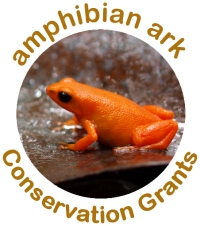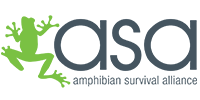| AArk has offered grants since 2009 and in the past these have been predominantly seed grants, for newly created ex situ programs, for species that have been assessed as in need of urgent ex situ rescue. While applications are welcomed from programs in all countries, this year we are especially keen to see applications to work with Atelopus species, in support of the Atelopus Survival Initiative (www.atelopus.org). We are also keen to see applications for extension grants from any existing ex situ program. Some new guidelines and requirements for grant recipients have recently been included, so please be sure to read the guidelines carefully. Download the complete guidelines here.
***Our grants are intended to support conservation projects for amphibian species that cannot currently be saved in the wild, with a focus on ex situ actions, and in partnership with appropriate field activities. Preference will be given to projects for species which have been assessed as in need of ex situ rescue or research work, either as a recommendation from a Conservation Needs Assessment (www.conservationneeds.org) or a similar, national assessment process.*** These grants are not intended to fund:
We will be accepting funding applications for the following types of grants:
All applicants for Start-up Grants or Mentorship Grants are required to submit a brief Project Outline, prior to submitting a full application. Ideally, your Project Outline should be in English or Spanish, but it can be submitted in any language. It should be less than 400 words in length, and should contain information under the following headings: Species, Organization, Project Manager, Previous amphibian husbandry experience, Goals, Proposed outcomes, Other funding sources (both requested and received) and the status of a Species Action or Recovery Plan for the species (including authors of the plan). Project Outlines for start-up grants from institutions with limited amphibian expertise must include a copy of the report from the Institutional Program Implementation Tool (www.amphibianark.org/program-implementation-tool/) for the species at your institution. Your final application should address any shortfalls highlighted within the tool. Project Outlines will be reviewed and successful applicants will then be invited to submit a full application. Full applications will not be accepted without a Project Outline having been submitted and approved by the review committee. Full applications Project Outlines which have been approved by our review committee will receive an invitation to submit a Full Proposal. Guidelines and requirements All applications must reflect AArk values. Please pay careful attention to the grant guidelines, and address all of the appropriate items. Requirements from grant recipients
Need some help? Important dates
|
|
We would like to acknowledge the generous support of AArk funders and donors who have helped to establish and support these grants.





 ASA Conservation Grants
ASA Conservation Grants




